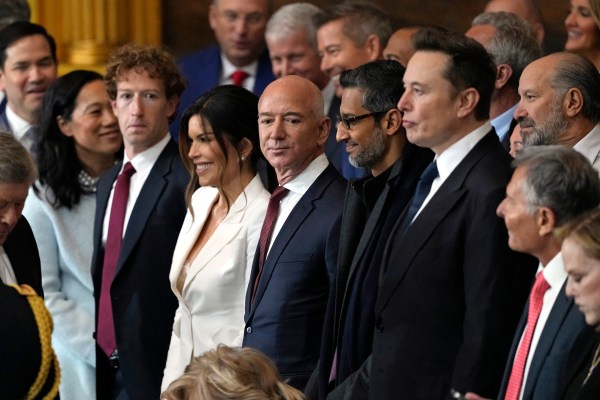Welcome to The Dispatch’s Fact Check section. We invite our readers to take a look at this page to understand our mission and our procedures, and to learn how to reach us with questions or to submit claims to fact check.
Who We Are: The Fact Check Team
Peter Gattuso is a fact check reporter for The Dispatch, based in Washington, D.C. Prior to joining the company in 2024, he interned at The Dispatch, National Review, the Cato Institute, and the Competitive Enterprise Institute.
Declan Garvey is the executive editor at The Dispatch and is based in Washington, D.C. Prior to joining the company in 2019, he worked in public affairs at Hamilton Place Strategies and market research at Echelon Insights.
Rachael Larimore is a managing editor of The Dispatch and is based in the Cincinnati area. Prior to joining the company in 2019, she served in similar roles at Slate, The Weekly Standard, and The Bulwark.
Steve Hayes is the co-founder, CEO, and editor of The Dispatch. He was previously the editor-in-chief of The Weekly Standard. He is the author of two New York Times bestsellers.
Michael Reneau is a managing editor at The Dispatch and is based in Greeneville, Tennessee. Prior to joining the company in 2022, he was editor of WORLD Magazine and for several years was editor of a daily newspaper in East Tennessee.
Wendy Lane Cook is the deputy managing editor of The Dispatch and is based in San Antonio, Texas. Before joining the company in 2024, she was the managing editor of the San Antonio Report. She also has worked as an editor at the Washington Post and as a writer and editor at the Associated Press.
Valerie Pavilonis is ideas editor at The Dispatch, based in New York City. Prior to joining the company in 2025, she worked at the New York Times and NewsGuard Technologies.
Our Fact Checking Methodology
In the interest of transparency, we’d like to share how “the sausage gets made.” Where do we find claims to fact check? We’re constantly scouring the internet for falsehoods or partial truths—from politicians, viral news stories, and partisan activists, among many other sources. We also invite readers to submit suggestions to factcheck@thedispatch.com.
After we’ve decided to investigate a claim, we ask ourselves whether the claim is verifiable one way or the other. If a claim is demonstrably false, is it likely to unfairly damage a person or group’s reputation? Is the claim a mix of half-truths that need to be separated and weighed individually?
Once the topic is decided, our fact checkers begin the reporting necessary to determine the veracity of the claim. Sometimes it’s very easy: a false claim starts spreading after someone edits audio or video of a public figure to make it look like they said or did something they didn’t say or do. We find the original video, and either link to it or include an embed.
Sometimes the answer is more complicated or requires more research. In those instances, we interview sources whom we consider experts on the subject matter at hand, scour public records for relevant documents, or both. We’ll also cite reported, fact-based news stories (not opinion columns) from reputable publications. Once the reporting is done and the article has been written, it is thoroughly fact-checked and edited, then prepared for publishing.
How We Source Our Fact Checks
Our fact checks rely on a number of different primary sources. When we are looking at audio or video that may have been deceptively edited or somehow manipulated—an increasingly common occurrence—we will search for the original source material and link to it or embed it so readers can view the original material themselves. In the case of a potentially false statement by a public figure, or a news article that we believe contains factual errors, we will report out the claim by interviewing expert sources or using public records (court documents, information put out by government agencies) to determine the veracity of a claim. We will also consult reported news stories from reliable sources or cite books that cover the same subject matter, and reach out to the original source of the claim when possible. In all cases, we will name our sources and link to published material.
Corrections Policy
Our corrections policy applies to fact checks, but also to everything that we publish. When The Dispatch is alerted to a possible error of fact in anything we publish (article, newsletter, podcast), we conduct whatever due diligence is necessary to ascertain whether we made an error. Typically, that involves checking back with our own sources and seeking out other reputable information. Simple errors like proper-name misspellings or incorrect use of numbers or amounts ($32 million instead of $32 billion) are corrected immediately, and other errors will be corrected once we have determined there was a mistake.
Once we determine a correction is necessary, we update the relevant text and place an asterisk at the end of the corrected sentence. We then append a note to the bottom of the article explaining the error and the correction.
International Fact Checking Network
The Dispatch is accredited by the International Fact Checking Network (IFCN) and is a participant in Meta’s third-party fact checking program. You can read more about the IFCN here. The Dispatch and other accredited fact checkers follow the IFCN Code of Principles. If you believe The Dispatch is in violation of the IFCN Code of Principles, you can contact the organization here.
Our Policy of Non-Partisanship
There is no room for partisanship when it comes to weighing misinformation and disinformation. No party has a monopoly on the truth, and politicians of all ideologies misspeak, tell half-truths, or sometimes outright lie. When we decide to report out a claim, we look at the claim itself, not the party affiliation of the person making it. We do consider factors such as how much harm a false claim can cause, whether a claim comes from a consistent purveyor or misinformation, and how blatantly false a claim might be. We strive for balance, but we do not follow a “quota” system to fact check each side 50-50: we will always be honest and fair in our assessments and ratings.
Who Owns The Dispatch?
The Dispatch is published by Dispatch Media, Inc. a digital media company providing engaged citizens with fact-based reporting and commentary on politics, policy and culture—informed by conservative principles. We deliver that work in newsletters, articles, and podcasts.
Dispatch Media is a majority employee-owned company. Excluding founders and employees, no single individual or entity owns more than 5.61 percent of the company. The company accepts no funding from politicians or political parties.
What Is the Company Policy on Political Engagement and Activism?
All employees of The Dispatch are prohibited from performing work for elected officials, candidates for office, or political parties. Employees must agree to this policy as a condition of employment. The Dispatch, as a matter of editorial policy, does not publish institutional endorsements of individual candidates or political parties.
Contact Us
We welcome your suggestions for claims to fact-check, and we also welcome readers to point out when we might need to correct something ourselves. If you see a news story, social media post, or comments by a public official that you think might warrant a fact check, please email us at factcheck@thedispatch.com. We cannot guarantee that we will pursue every fact check suggested to us: We do not fact check opinions, for example. For questions about something we’ve published in The Dispatch, send email to corrections@thedispatch.com. If you have general questions, please send them to info@thedispatch.com.






Please note that we at The Dispatch hold ourselves, our work, and our commenters to a higher standard than other places on the internet. We welcome comments that foster genuine debate or discussion—including comments critical of us or our work—but responses that include ad hominem attacks on fellow Dispatch members or are intended to stoke fear and anger may be moderated.
With your membership, you only have the ability to comment on The Morning Dispatch articles. Consider upgrading to join the conversation everywhere.